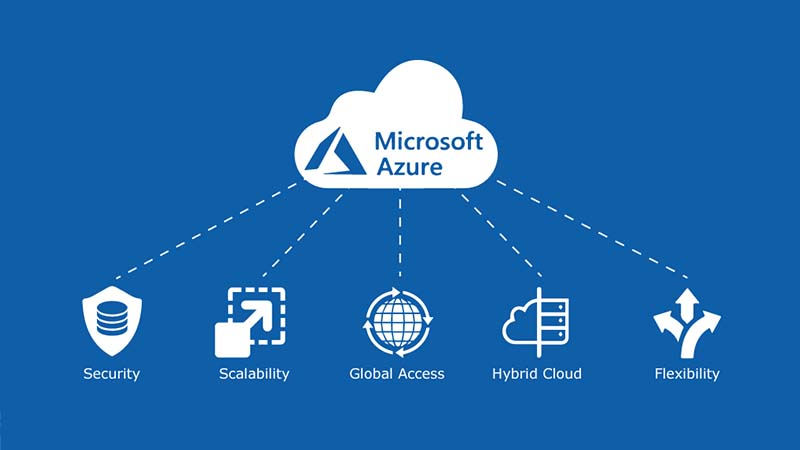Azure Fundamentals exam, one of the Microsoft online courses, provides an opportunity to display knowledge of cloud concepts, Azure services, Azure workloads, security and privacy in Azure, and Azure pricing and support. The Microsoft Azure Fundamentals level certification course can be taken by individuals who are just starting their career path on Microsoft Azure technology or even those having less than two years of experience in the cloud domain. These fundamental-level Microsoft certifications are also suitable for professionals looking for a career change within the Microsoft Azure platform.
Here is a comprehensive set of guidelines for the Microsoft Azure FundamentalsAZ900 that you can use to analyze the topics, direct your preparation, and clear the certification exam.
About This Certification Exam
AZ-900 exam can be considered relatively easy compared to other Microsoftrole-based exams. This exam will include questions from 4 modules described below.
1 Module: Cloud Concepts (15-20%)
2 Module: Core Azure Services (30-35%)
3 Module: Security, Compliance, Privacy, and Trust (25-30%)
4 Module: Azure Pricing and Support (20-25%)
Further classification of all four modules enlisted below to provide a greater understanding of the bifurcation of topics-
- MODULE 1:
Describing Cloud Concepts:
In this module, there will be questions related to the basic cloud concepts such as Infrastructure-as-a-Service (IaaS), Platform-as-a-Service (PaaS), and Software-as-a-Service (SaaS). Understanding the difference between these services is imperative because the questions will be on what type of service is WebApp or Office 365. The concepts of cloud models, i.e., Public, Private, and Hybrid cloud models, are also important aspects. Understanding the keywords such as High Availability, Scalability, Elasticity, Agility, and Fault Tolerance and some examples related to them will be beneficial.
- MODULE 2:
Core Azure Services:
This module will provide questions on core Azure architectural components, core Azure services and solutions, and various management tools. To answer questions based on these, one must understand the network of secure data centers to deploy services, how redundancy is provided, and service guarantees from Azure.
There could be more questions on networking services like Virtual Network, Azure Load Balancer, VPN Gateway, Application Gateway, virtual machines, containers, and Azure Content Delivery Network. A few questions could be on Azure Data Lake Analytics, HDInsight, or SQL Data Warehouse. Lastly, in the Azure management tools section, there will be questions on Portal, PowerShell, CLI, Cloud Shell, and Azure Advisor, which provide recommendations on high availability, security, performance, and cost.
- MODULE 3:
Security, Compliance, Privacy, and Trust:
One can expect questions on securing network connectivity in Azure, compliance requirements and protecting sensitive customer data. One could anticipate many questions on Azure identity solutions like Authentication, Authorization, and Multi-Factor Authentication; hence, they should emphasize this. A few questions could be on Azure Policy and Blueprints. Resource Locks help governance in Azure.
- MODULE 4
Azure Pricing & Support:
Expect questions on costing, Azure support plans, Azure Service Level Agreements, and the service lifecycle in Azure. This section has essential questions on Azure subscriptions- Planning & managing costs. After completing this module, you can understand the pricing and support models available with Microsoft.
Prerequisites:
Candidates should be familiar with general technology concepts, including networking, storage, computing, application support, and application development. Whether you are a Software Developer, Microsoft certified professional, System Administrator, Sales and Marketing personnel, or into procurement, gaining knowledge about cloud services and cloud security is pertinent. Irrespective of your technical background, AZ-900 is meant for everyone. And anyone trying to get elementary knowledge on Azure cloud services under the umbrella of Microsoft certification courses.
Exam Pattern:
AZ-900 examination has around 40 to 60 questions, comprising MCQ (Multiple Choice Questions), Short Answers, or Fill in the blanks, which you have to attempt in 85 minutes. The passing mark for the examination is 700.
Study Material & Reference:
The Microsoft Official Courseware (MOC), Microsoft Documentation, and Microsoft Learn Portal are self-learning portals. Alternatively, one can opt for instructor lead training that can help you learn the Azure fundamentals with a structured approach.
Course Objective:
A Microsoft Azure certification validates your cloud skills and demonstrates your expertise for a given role. There are predictions that around 80% of all enterprise workloads will move to the cloud by 2025. Hence, there will be high demand for professionals who can develop cloud applications and manage cloud infrastructures. And a Microsoft Azure certification will help you gain these skills. It will help you master the Azure infrastructure by understanding Azure Cloud Architect Technology Solutions, implementing workloads and security in Azure, creating and deploying apps in Azure, and securing data in Azure.
Conclusion:
These were a few tips to remember to sail smoothly through the final examination. The gap between training and appearing for the exam should be kept to a minimum. So, that the concepts are fresh in your mind. If a particular question seems complicated, mark it for later & you can attempt it towards the end of the test. There is a provision for reattempts to the AZ-900 exam in case you fail it on the first attempt. However, you will have to wait for at least 24 hours to retake the exam. If the second attempt is not cleared, you can make the next examination attempt after 14 days. A maximum of 5 retake attempts are permissible for clearing. The AZ-900 examination in a single year (starting from your first attempt).

